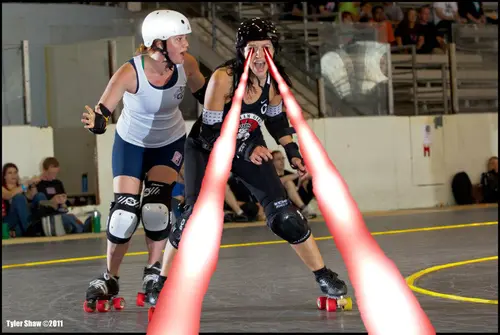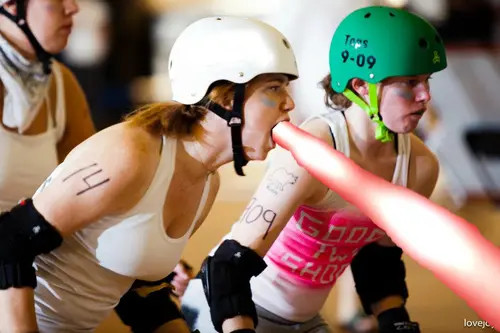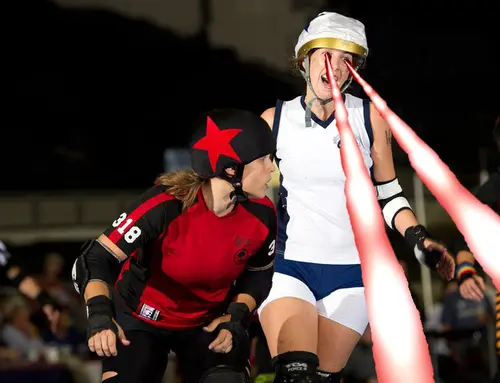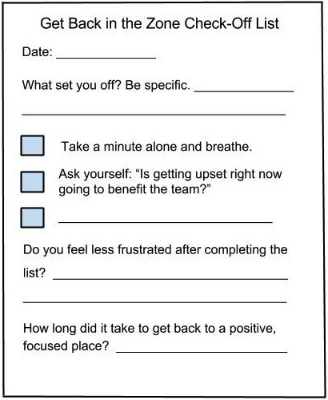I take a lot of pride in my ability to remain calm during chaotic moments. For the most part, it takes a lot to shake me. I've never had a meltdown, yelled at anyone, or lost my cool in derby.
I love roller derby. I love competition. I love training. So when it's game time, I get excited. It takes a lot to ruin that thrill and joy, but it has happened. I've headed into a bout with anger and resentment toward my teammates. I've skated in bouts when my entire team became infected with negativity. I've been on the track with skaters arguing with me and other teammates mid-jam, skaters arguing with officials, skaters falling apart. I'm talking about experienced, talented skaters. These moments don't define a person -- they are just a reflection of a missing skill set: mental game. If you struggle with mental game, Dr. Punchy is here to help!
As a coach, I've spent a significant amount of time as an uncertified Sports Psychologist. Many of my one-on-one discussions are like therapy sessions. That's not because everyone is a hot mess; it's because there's so much more to the game than physical skill. We really, really, REALLY need to spend more time training our minds and developing mental toughness.
Mental toughness is the ability to persevere through difficult situations, block out what's not important, and stay focused, calm, and in control when under pressure. Your mental toughness (or lack thereof) directly affects how you perform. If you don't have your shit under control, you won't - CAN'T - play your best.
In my experience, I've identified some common issues with derby skaters, and all of them can be managed, but it takes time and work. Nothing comes easy with derby, as you know!
Build Your Confidence
Confidence comes in having an unshakable belief in your abilities. Skaters who don't believe in themselves set themselves up for failure. If you've decided that you can't do something before you even try, chances are you won't be able to do it.
One way to build confidence is to replace negative self-talk with positive task-oriented statements. Or, as an article about the mental training of Olympic athletes puts it, "evict the obnoxious roommate in your head." Change how you speak to yourself (whether in your mind or aloud). This changes how you approach a task. For example, instead of saying "I suck at hockey stops," say, "I need to practice my hockey stops." Instead of saying "the refs are calling me on bullshit penalties," say, "I will play clean and smart." We all deal with more than enough shit from the capitalist, white supremacist, patriarchal society we live in. We don't need to make it tougher for ourselves.
Another way to build confidence is to set specific, realistic goals. Setting goals and working to achieve them builds confidence, motivation, self-discipline, and long-term vision, because you understand that you are capable of improving when you put in the hard work. Successful athletes dream big and set SMART goals. (What? You need some help with setting goals? Check out my eBook.)
Visualization is another way to build confidence. Before practice or a game, take a moment to picture yourself performing at your full capacity. Try to incorporate all your sense. See the outcome you want, but also feel the movements in your bones. Smell the funk in the air. Hear the clack of your skates against the track. Visualization trains your brain for success.
Don't Expect Perfection
Far too many skaters expect to perform perfectly. When they make a mistake, they might fall apart, lose confidence, and give up. We train to be the best athlete we can be, but we are human, and we make mistakes. No one is perfect. Rationally, we know that, so why do so many skaters expect to perform perfectly?
If you are one of these skaters, I'm speaking directly to you when I write this: YOU AREN'T PERFECT. GIVE YOURSELF PERMISSION TO MAKE MISTAKES. I promise you: no babies will die, no kittens will be slaughtered, and no earthquakes will occur if you make a mistake. I hate to break it to you, but you aren't that important.
If you expect perfection of yourself, you will always be disappointed. Who is perfect around here anyway? You think Bonnie Thunders never makes mistakes? I'm sure she could list a few she's not too proud of. And if she can't, I'm gonna throw myself through a window.
Allow yourself the freedom to make mistakes, and trust that you'll learn from those mistakes. You're not giving yourself permission to perform like you're at a Sunday skate session. You're telling yourself it's okay to mess up sometimes. Again, no one is going to die because you messed up.
In turn, give the same freedom to your teammates, coaches, and officials. They are going to make mistakes, too. Sometimes it will happen at the worst moment, and you have to be okay with that. Be realistic and allow yourself, your teammates, your coaches, and the officials to be human and make mistakes.
Learn to Let Go of Mistakes
Once you understand that mistakes happen, the next step is learning to let go. Don't celebrate your failures. You've seen (or maybe you've been) the skater who made a mistake or was unhappy with a moment and threw a mini-tantrum. In that mini-tantrum moment the skater broadcasted their lack of focus, instead of moving on to the next derby job. There's no time for tantrums! There are derby jobs to be done!
Practice jamnesia. If the bad stuff that happened in the last jam has a negative effect on your performance, delete it from your mind. Take it one jam at a time. And if that's not enough, take it one pass at a time. Either way, don't spend the time you could be refocusing by punishing yourself with negative self-talk. No good comes of it.
If you are in the habit of punishing yourself for mistakes, you can trust that if you stop punishing yourself you aren't going to turn into an egomaniac. Just make a mental note of the mistake without taking away from your focus. Accept that you cannot go back in time and change anything, and know that you can, at future practices, work to improve.
We fail our way to success, and it is through those failures that we learn how to succeed. Try to look at failures as steppingstones for future achievement. We don't have growing pleasures. We have growing pains. They are painful because growing is hard. The ultimate reward, though, is improvement. We all want that, right?
Get in the Zone and STAY in the Zone
The zone is your place of full focus. It's your womb of amazing-town. It's where you perform at your full capacity. Hopefully, you know what it feels like to be in the zone and how exhilarating it feels to perform in the zone. If you know that, you probably know what it feels like to be out of the zone and how it leads to explosive pooping, pregnancy, herpes, and/or death. (Okay, none of those things will happen, but it really feels like it!)
In order to get in the zone, one option that might help is to develop a pre-practice/pre-bout routine, a ritual. I think the weirder it is, the better, just make sure it's something you can take on the road when you have away bouts. Maybe you sleep in your uniform, then listen to "Pop the Trunk" when you wake up, practice visualization for five minutes, and then eat Razzles while humping the air. Whatever it is, do it EVERY time. This will train your mind to recognize the signals that lead to getting in the zone. Make a checklist for yourself.
Once you get in the zone, work on staying in it. Develop strategies to ignore and eliminate distractions. Recognize when you lose focus, and make a list of what takes you out of the zone (include internal and external distractions). Make another list of three things you can do to help refocus (ie. taking slow, deep breaths; visualizing yourself back in the zone; chanting a mantra), and do science to yourself. Choose one of your refocusing strategies and test it for 4-6 weeks. Notice if you are able to regain focus quicker. Keep track of your progress (use the little worksheet below). If one of the strategies does not work after the time allotted, try another strategy until you find the one that works for you.
There's still more. You need a game face. Make sure you never let your opponent see you lose focus. You don't literally have to paint on a game face (unless that's your thing), but make sure you aren't broadcasting your emotional state. Trust me, if I'm playing against you and I see you lose your shit, I will take advantage of it.
Develop a Love of Challenge
People react several ways to challenge:
- With fear, doubt, and negativity that most often leads to failure without growth.
- With anxiety about performance, but giving it a shot.
- With excitement for an opportunity to test yourself and inspired to take on the challenge. This leads to the most growth.
Get to a place where you want a challenge. You NEED a challenge, because you recognize the opportunity for growth and success. There's no simple way to develop a love of challenge. It's all about changing your perspective about challenges. Maybe if I get a real degree in Sports Psychology I'll be able to explain how to do that.
Understand Team Mentality
This means you always consider what’s best for the team, not what’s best for YOU. Everything you do on and off the track is because it's what the team needs. When you get stuck in your own head or emotional response, understand that you are making that moment about you and robbing your team of your full focus and talent. Look at these people! They are a team!
There are many ways instances when a skater can make a moment about themselves or do what's best for the team. For instance:
- You are called on a penalty you don’t agree with. Does it help the team for you to stop mid-jam and argue with an official? Or is it best for the team if you quickly remove yourself and sprint to the box, so your penalty time will start immediately, and you will be back on the track as soon as possible?
- You are jamming against really tough defense. The opposing jammer has lapped you twice. Does it help your team if you give up and leave the track? Or is it best to stay focused and continue fighting against the defense?
- You really want to win the bout and your team is not performing their best. Does it help the team to pout on the bench, bitch at your teammates, throw your helmet and stop trying your hardest on the track? Or is it best to get control of your emotions quickly, so your negativity does not infect the team?
Speaking of negativity, it is more viral than the double rainbow. You can’t expect your teammates to just “deal” with your shitty moments. They are affected, too, and sometimes it messes up their game. It doesn’t mean you can’t ever break down. It means you can’t always break down.
When you put the team before yourself, you feel compelled to move beyond your own shit and see the bigger picture: you are part of a beautiful, amazing team, and they need you. This doesn't mean that you ignore injury or taking care of yourself. You have to take care of yourself, so you can be 100 for your team.
Other Helpful Articles about Mental Game
Blocking with the Head: The Importance of the Mental Game in Roller Derby | Kid Block
No Excuses Mental Training | Deadwards in Derby
Relearning How to Learn | Roller Derby Athletics





Developing Mental Toughness